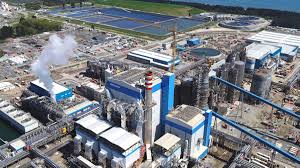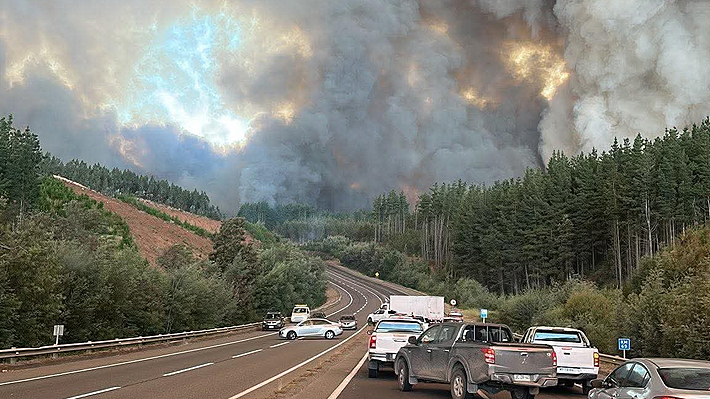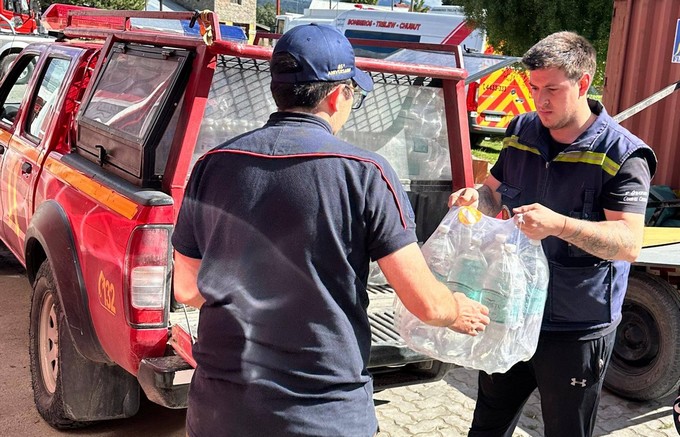Despite the reduction in plantations, uncertainty due to wildfires, timber theft, and even the possibility of Chile having a communist president, Arauco, the forestry company of the Angelini Group, asserts its interest in continuing to invest in the country.
The firm is diversified abroad, with productive operations in 1 country. In Brazil, it will invest US$4.6 billion in building its largest pulp plant, Sucuriú, in the state of Mato Grosso do Sul. This will increase its production capacity of this raw material from 5.3 million tons per year to nearly 8.8 million by 2027, positioning it as the second-largest player in the sector, behind Brazil's Suzano.
"Arauco is in a very positive moment. We work with wood, and today, globally, the focus on carbon footprint, recycled products, and those that can replace less environmentally friendly alternatives has a spectacular future," said Cristián Infante, General Manager of Arauco. The executive, who will complete 30 years with the company in 2026—11 of them leading its management—spoke with "El Mercurio" at the Constitución plant in the Maule Region. He visited the area to celebrate the facility's 50th anniversary, the oldest in the company.
—Are there investments in Chile, or is the focus entirely on Brazil with Sucuriú?
"The largest investment in the company's history was MAPA, which we carried out in Chile, in Arauco (Biobío)—a 1,560,000-ton pulp plant that we started. This gives us a very high pulp production share in Chile, so the natural next step was seeking an alternative, which is why we are now in Brazil. Additionally, Brazil offers favorable natural conditions for growth, tree development, and raw material availability."
"But we also have a quite interesting investment portfolio in Chile. We are building an OSB (panel) plant in the south, in the Trupán-Cholguán complex. Furthermore, we have significant wind potential, with around 15 wind farms we can develop on our land, and we are well advanced. The Viento Sur project, south of Arauco, is 250 megawatts and has its RCA approved, but like many initiatives in Chile, it faces permit litigation issues."
—What is the potential investment portfolio in Chile?
"We have a wind potential of 2,000 megawatts in Chile—meaning, if all projects were executed, it would total US$2 billion. The OSB plant represents US$92 million."
—Do permitting delays, timber theft, and the lack of raw materials (trees) hinder faster progress in forestry investment in the country?
"To expand our plants, we need more raw materials. Unfortunately, the number of forested hectares in Chile has declined for several reasons, including wildfires, where the percentage of intentional fires is quite high compared to other parts of the world. Forested land has decreased from 2.4 million hectares to around two million, limiting potential growth and future investments in Chile."
"Regarding timber theft, after the law was passed, it has decreased significantly. It will always be an issue, but today it is not a limiting factor for development."
—Has Chilean export development reached its limit, as former Concertación minister and ex-senator Carlos Ominami claimed?
"No, not at all. I believe that in Chile, as long as we resolve certain obstacles to investment, such as permitting, we can move forward. Chilean entrepreneurs have proven, both in Chile and abroad, that when opportunities and conditions arise, they can generate value."
—Would you continue investing in Chile if the President were communist? "Rather than focusing on whether to invest or not, we must consider the conditions. Chile has reached a very important consensus: two fundamental elements are clear for the country's progress. One is that growth matters, and the other is that security and order also matter. If the new President, whatever their political color, prioritizes and works toward these goals, we are undoubtedly ready to keep investing."
—Are growth and security conditions more important than political affiliation?
"Today, we are investing in Brazil, and the President is Lula. We have no issues. What matters to us are the conditions."
Sucuriú in Brazil was approved in just 18 months
—With the Sucuriú plant, Arauco would become the world's second-largest pulp producer. Do you aspire to be number one?
"Being number one doesn’t keep us up at night. We want to be a company that generates value—not just in words but for our workers, communities, and shareholders. In this sense, we prefer healthy, robust growth."
"When you look at other companies, like Suzano, they grew and became what they are today through consolidating various firms. Arauco’s pulp growth has been almost entirely organic."
—Is investment support in Brazil much stronger than in Chile?
"In Chile, the difference with Brazil, unfortunately, lies in permitting. Large projects in Chile take much longer and involve significant uncertainty. Even after obtaining permits, there’s a period of litigation. In my view—and this is common globally—once authorities grant a permit, any challenges should be between the claimant and the authority. The private entity that secured the permit shouldn’t face issues, ensuring legal certainty."
—The MAPA plant in Biobío cost around US$3 billion, while Sucuriú is US$4.6 billion. How long did permitting take in each case?
"Sucuriú: 18 months. MAPA, with litigation, took eight or nine years. In that time, Brazil built three pulp plants."
—The U.S. just threatened Brazil with 50% tariffs. Are you concerned about your investments in the Brazilian market?
"It’s still too early to assess the implications of this announcement."
U.S.: Tariffs and New Opportunities
—How are your U.S. investments, and how do tariffs affect your outlook?
"Uncertainty doesn’t help business. If import tariffs are imposed, it will obviously impact local markets, prices, and our operations. In the U.S., we are the leader in board production. We are very comfortable working there—we’ve grown, and the synergy between our local operations and global imports allows us to serve highly demanding clients."
—President Trump has pushed for local production. Do you plan to expand in the U.S.?
"We are very comfortable in the U.S. and always open to opportunities... We’ve invested approximately US$1.5 billion there."
—Have tariffs impacted the timber sector?
"Yes, for some more processed products, like painted moldings entering the U.S., which are very relevant. Since March, these face a 10% tariff. Other products, like sawn timber or plywood, are unaffected, so we’re monitoring the situation."
Source:El Mercurio







Comments (0)
No comments yet. Be the first to comment!
Leave a comment